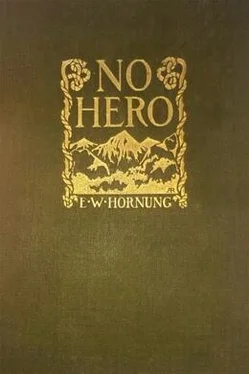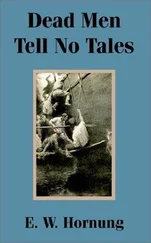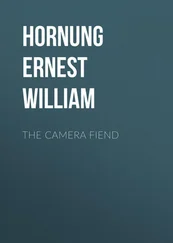"You don't mean to tell me," said I, aping the surprise I might have felt, "that our friend wrote and gave Mrs. Lascelles away to you of his own accord?"
But Quinby did not vouchsafe an answer. "Hard luck, Sir John!" cried he, as the judge missed an easy cannon, leaving his opponent a still easier one, which lost him the game. I proceeded to press my question in a somewhat stronger form, though still with all the suavity at my command.
"Surely," I urged, "you must have written to ask him about her first?"
"That's my business, I fancy," said Quinby, with a peculiarly aggressive specimen of the nasal snigger of which enough was made in a previous chapter, but of which Quinby himself never tired.
"Quite," I agreed; "but do you also consider it your business to inquire deliberately into the past life of a lady whom I believe you only know by sight, and to spread the result of your inquiries broadcast in the hotel? Is that your idea of chivalry? I shall ask Sir John Sankey whether it is his," I added, as the judge joined us with genial condescension, and I recollected that his proverbial harshness toward the male offender was redeemed by an extraordinary sympathy with the women. Thereupon I laid a general case before Sir John, asking him point–blank whether he considered such conduct as Quinby's (but I did not say whose the conduct was) either justifiable in itself or conducive to the enjoyment of a holiday community like ours.
"It depends," said the judge, cocking a critical eye on the now furious Quinby. "I am afraid we most of us enjoy our scandal, and for my part I always like to see a humbug catch it hot. But if the scandal's about a woman, and if it's an old scandal, and if she's a lonely woman, that quite alters the case, and in my opinion the author of it deserves all he gets."
At this Quinby burst out, with an unrestrained heat that did not lower him in my estimation, though the whole of his tirade was directed exclusively against me. I had been talking "at" him, he declared. I might as well have been straightforward while I was about it. He, for his part, was not afraid to take the responsibility for anything he might have said. It was perfectly true, to begin with. The so–called Mrs. Lascelles, who was such a friend of mine, had been the wife of a German Jew in Lahore, who had divorced her on her elopement with a Major Lascelles, whom she had left in his turn, and whose name she had not the smallest right to bear. Quinby exercised some restraint in the utterances of these calumnies, or the whole room must have heard them, but even as it was we had more listeners than the judge when my turn came.
"I won't give you the lie, Quinby, because I am quite sure you don't know you are telling one," said I; "but as a matter of fact you are giving currency to two. In the first place, this lady is Mrs. Lascelles, for the major did marry her; in the second place, Major Lascelles is dead."
"And how do you know?" inquired Quinby, with a touch of genuine surprise to mitigate an insolent disbelief.
"You forget," said I, "that it was in India I knew your own informant. I can only say that my information in all this matter is a good deal better than his. I knew Mrs. Lascelles herself quite well out there; I knew the other side of her case. It doesn't seem to have struck you, Quinby, that such a woman must have suffered a good deal before, and after, taking such a step. Or I don't suppose you would have spread yourself to make her suffer a little more,"
And I still consider that a charitable view of his behaviour; but Quinby was of another opinion, which he expressed with his offensive little laugh as he lifted his long body from the settee.
"This is what one gets for securing a room for a man one doesn't know!" said he.
"On the contrary," I retorted, "I haven't forgotten that, and I have saved you something because of it. I happen to have saved you no less than a severe thrashing from a stronger man than myself, who is even more indignant with you than I am, and who wanted to borrow one of my sticks for the purpose!"
"And it would have served him perfectly right," was the old judge's comment, when the mischief–maker had departed without returning my parting shot. "I suppose you meant young Evers, Captain Clephane?"
"I did indeed, Sir John. I had to tell him the truth in order to restrain him."
The old judge raised his eyebrows.
"Then you hadn't to tell him it before? You are certainly consistent, and I rather admire your position as regards the lady. But I am not so sure that it was altogether fair toward the lad. It is one thing to stand up for the poor soul, my dear sir, but it would be another thing to let a nice boy like that go and marry her!"
So that was the opinion of this ripe old citizen of the world! It ought not to have irritated me as it did. It would be Catherine's opinion, of course; but a dispassionate view was not to be expected from her. I had not hitherto thought otherwise, myself; but now I experienced a perverse inclination to take the opposite side. Was it so utterly impossible for a woman with this woman's record to make a good wife to some man yet? I did not admit it for an instant; he would be a lucky man who won so healthy and so good a heart; thus I argued to myself with Mrs. Lascelles in my mind, and nobody else. But Bob Evers was not a man, I was not sure that he was out of his teens, and to think of him was to think at once with Sir John Sankey and all the rest. Yes, yes, it would be madness and suicide in such a youth; there could be no two opinions about that; and yet I felt indignant at the mildest expression of that which I myself could not deny.
Such was my somewhat chaotic state of mind when I had fled the billiard–room in my turn, and put on my overcoat and cap to commune with myself outside. Nobody did justice to Mrs. Lascelles; it was terribly hard to do her justice; those were perhaps the ideas that were oftenest uppermost. I did not see how I was to be the exception and prove the rule; my brief was for Bob, and there was an end of it. It was foolish to worry, especially on such a night. The moon had waxed since my arrival, and now hung almost round and altogether dazzling in the little sky the mountains left us. Yet I had the terrace all to myself; the magnificent voice of our latest celebrity had drawn everybody else in doors, or under the open drawing–room windows through which it poured out into the glorious night. And in the vivid moonlight the very mountains seemed to have gathered about the little human hive upon their heights, to be listening to the grand rich notes that had some right to break their ancient silence.
"If doughty deeds my lady please,
Right soon I'll mount my steed;
And strong his arm, and fast his seat,
That bears frae me the meed.
I'll wear thy colours in my cap,
Thy picture at my heart;
And he that bends not to thine eye
Shall rue it to his smart!"
It was a brave new setting to brave old lines, as simple and direct as themselves, studiously in keeping, passionate, virile, almost inspired; and the whole so justly given that the great notes did not drown the words as they often will, but all came clean to the ear. No wonder the hotel held its breath! I was standing entranced myself, an outpost of the audience underneath the windows, whose fringe I could just see round the uttermost angle of the hotel, when Bob Evers ran down the steps, and came toward me in such guise that I could not swear to him till the last yard.
"Don't say a word," he whispered excitedly. "I'm just off!"
"Off where?" I gasped, for he had changed into full mountaineering garb, and there was his greased face beaming in the moonlight, and the blue spectacles twinkling about his hat–band, at half–past nine at night.
"Up the Matterhorn!"
Читать дальше










